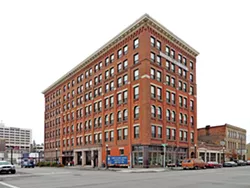By the end of October, the 127-bed Carlyle Care Center will stop providing round-the-clock care to people with chronic mental illness, nonprofit Pioneer Human Services announced to staff and residents on Wednesday, April 26.
The Carlyle, at Post Street and Second Avenue in downt

As of the end of October, the Carlyle Care Center will no longer provide care for 127 people with chronic mental illness.
The people who live there, long-term or short-term, are referred in, and often on Medicaid. They receive meals, medications, nursing care, room cleaning, activities and other care.
Because Medicaid rates haven't kept pace with the cost of providing that intensive care, the facility will have to transition and provide a different type of service, says Hilary Young, a Pioneer spokeswoman.
"Like a lot of publicly funded services, rates have not kept pace with the costs," Young says. "It's really expensive."
Some of the residents at the Carlyle already transition in and out in a manner of weeks or months, so some of them would already be on their way to lower-level service facilities, she says. About half the residents stay for more than a year, and the other half stay for less time.
"Over the next six months we'll be working with partners in the community and other assisted living providers to secure housing for everybody who lives at the Carlyle today," Young says. "Words like 'closure' tend to cause panic, I would say this is a transition. There are still going to be housing resources for high-needs people, and Pioneer still expects to be in that role, just not in assisted living."
When residents were told about the change on Wednesday, Frontier Behavioral Health, which provides mental health services to many of the people who live at the Carlyle, had staff on site to make sure they knew that a team of people would help them transition through this, says Jeff Thomas, Frontier's CEO.
"The fact there’s that amount of time is really fortunate," Thomas says. "It's really a testament to Pioneer’s commitment to helping people transition out."
While the news could be unsettling or concerning for the residents and community, Thomas says both agencies will work with the Spokane County Regional Behavioral Health Organization and other care facilities over "the gift of time we do have" to find people stable housing, and patients will continue to receive mental health care from Frontier.
"We were there, so they had a sense there’s a community team approach working to assist them, so they aren’t going to be kicked to the curb or put out in the cold," Thomas says.
It's still not clear what the Carlyle will transition into, though it may look more like supportive affordable housing, where residents are typically much more independent, and don't need meals or nursing services, but still have access to on-site case managers or treatment groups, Young says.
Pioneer bought the Carlyle from the city of Spokane for $3.2 million in 2011, according to property records. The city obtained the property after it went into foreclosure in 2006, saving it as housing for the vulnerable; Pioneer made an offer after the city sought bids for someone to take over providing care there, the Spokesman-Review reported in 2010.
When asked if Pioneer Human Services had looked at partnering with the city, Young says that they've "explored a fair number of options."
Pioneer currently serves about 600 people a day in Spokane across services that help people transitioning out of prison find housing, provide inpatient and outpatient treatment for drug and alcohol use, as well as mental health and more, Young says.
